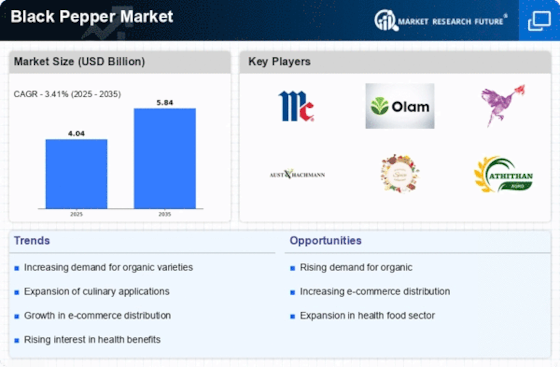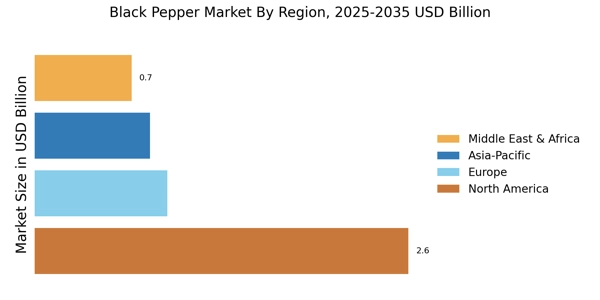Expansion of the Spice Trade
The Black Pepper Market is significantly influenced by the expansion of the spice trade, which has seen a resurgence in recent years. As international trade agreements facilitate easier access to spices, black pepper has emerged as a key commodity in this sector. Market data reveals that the export of black pepper has increased, particularly from major producing countries, contributing to a competitive pricing environment. This expansion not only enhances the availability of black pepper but also encourages innovation in its application across various culinary traditions. The growing spice trade is likely to bolster the Black Pepper Market, as it opens new avenues for distribution and consumption, thereby increasing overall market size.
Increasing Use in Food Processing
The Black Pepper Market is experiencing a notable surge in demand due to its increasing utilization in food processing. As manufacturers seek to enhance flavor profiles and preserve food, black pepper has become a staple ingredient in various processed foods. The market data indicates that the food processing sector accounts for a substantial share of black pepper consumption, with projections suggesting a growth rate of approximately 5% annually. This trend is likely driven by the rising consumer preference for flavorful and natural ingredients, which aligns with the industry's shift towards healthier food options. Consequently, the Black Pepper Market is poised to benefit from this growing demand, as food processors increasingly incorporate black pepper into their products to meet consumer expectations.
Innovation in Product Development
The Black Pepper Market is witnessing innovation in product development, which is contributing to its growth. Manufacturers are exploring new applications for black pepper, including its use in health supplements, functional foods, and even cosmetics. This diversification of product offerings is likely to attract a broader consumer base, as black pepper is recognized for its versatility. Market data suggests that innovative products incorporating black pepper are gaining traction, particularly among younger consumers who are more adventurous in their culinary choices. As the Black Pepper Market continues to evolve with new product innovations, it may enhance its market presence and appeal to a wider audience.
Rising Demand for Natural Ingredients
The Black Pepper Market is benefiting from the rising demand for natural ingredients in food and beverage products. Consumers are increasingly seeking products that are free from artificial additives and preservatives, leading to a shift towards natural flavoring agents like black pepper. Market data suggests that the natural food segment is expanding rapidly, with black pepper being a preferred choice due to its health benefits and flavor-enhancing properties. This trend is likely to drive growth in the Black Pepper Market, as manufacturers respond to consumer preferences by reformulating products to include more natural ingredients. The emphasis on clean labels and transparency in sourcing is expected to further propel the demand for black pepper in various applications.
Growth in the Health and Wellness Sector
The Black Pepper Market is experiencing growth driven by the increasing focus on health and wellness among consumers. Black pepper is recognized for its potential health benefits, including antioxidant properties and digestive support, which are becoming more appealing to health-conscious individuals. Market data indicates that the health and wellness sector is expanding, with consumers actively seeking products that promote well-being. This trend is likely to enhance the demand for black pepper as a functional ingredient in dietary supplements and health foods. As the Black Pepper Market aligns itself with the health and wellness movement, it may see a significant uptick in consumption, particularly in products marketed for their health benefits.

















